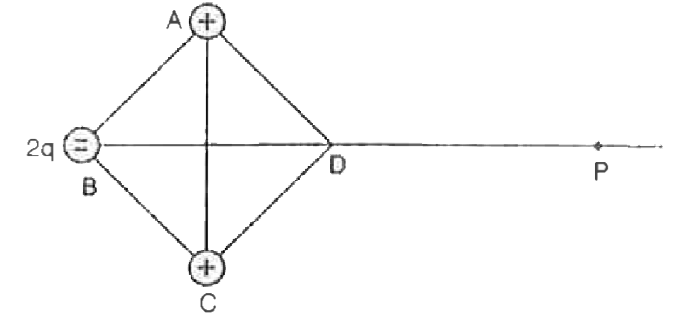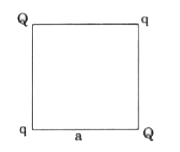A system consists of two identical dipoles placed along the sides of a square ABCD in such a way that +q and +q lie at the corner A and C and −q and −q at the corner B . Calculate the potential due to the system on the diagonal BD at a distance r from the intersection of the diagonals of the square . The length of each diagonal is 2a .

Step by step video & image solution for A system consists of two identical dipoles placed along the sides of a square ABCD in such a way that +q and +q lie at the corner A and C and -q and -q at the corner B . Calculate the potential due to the system on the diagonal BD at a distance r from the intersection of the diagonals of the square . The length of each diagonal is 2a . by Physics experts to help you in doubts & scoring excellent marks in Class 12 exams.
Updated on:21/07/2023Topper's Solved these Questions
Similar Questions
Length of the diagonal of a square is 12 cm. Find the length of each side of the square.
View SolutionA system consists of charges +q and +q at the opposite corners of a square of sides 2a and −q and −q at the other two corners . Calculate the potential and field at a distance r from the centre of the square along a line parallel to the two sides of the square . Assume a <<r .
View Solution
Knowledge Check
If the length of diagonal BD of a square ABCD is 4.8 cm, the area of the square ABCD is :
A9.6cm2B11.52cm2C12.52cm2D5.76cm2If the length of diagonal BD of a square ABCD is 4.8 cm, the area of the square ABCD is :
A9.6cm2B11.52cm2C12.52cm2D5.76cm2
Charges of +q,+2q,+q and −q, are placed at the cornersof a square ABCD. Calculate the electric field at the intersection of the diagonals of the square when q=53×10−9C and length of each side is 10 cm.
View SolutionThree charges +q,+qand−q are located at the corners of an equilaterial triangle of side a. Calculate potential energy of the system.
View SolutionFour charges +q,+2q,+3q and +4q are placed at the four corners ABCD of a square of side a. Calculate the field and potential at the centre of the square.
View SolutionFour point charges Q , q Q and q are placed at the corners of a square of side 'a' as shown in the Fig. Find the
potential energy of this system .
View SolutionCalculate the electrostatic potential energy for a system of three point charges q placed at the corners of an equilateral triangle of side ‘a’.
View SolutionFour point charges Q.q Q and q are placed at the corners of a square side 'a' as shown in the figures.

Find the Potential energy of this system.
View Solution
